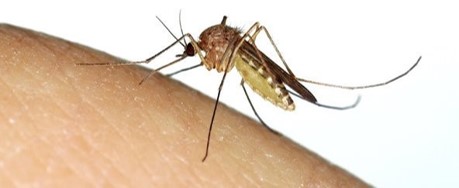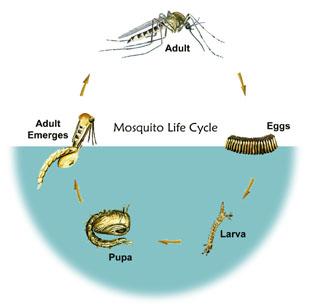
Mosquitoes are an everyday presence in most people's lives. While a large portion of mosquitoes are just a nuisance, some are capable of carrying diseases (called vectors) and it is important to protect ourselves from mosquitoes bites.
Habitat Preferences
Vermont has 46 different species of mosquitoes, all with varying habitat and host preferences. Mosquitoes require water as three of the four life stages are aquatic. Some species prefer to lay eggs in permanent bodies of water, like along the edges of ponds and lakes, while others prefer temporary bodies of water, like pools in forests, fields that flood with large rain events, or even small containers in your yard that fill with rainwater. See what habitats different Vermont mosquito species prefer.
Depending on the species of mosquito, females either lay their eggs singly on the water surface, in a “raft” of hundreds of eggs on the water’s surface, or singly on soil above water that will eventually flood.
Life Cycle

- Eggs hatch into larvae and molt four times, getting larger after each molt. Since larvae live in water, most species have siphons to breath air from the water’s surface. Larvae feed on organic matter and microorganisms in the water.
- The pupal stage is a time of rest where the mosquito changes into an adult. They do not feed in this stage.
- Newly emerged adults will rest on the water’s surface to dry off. After a couple days, blood feeding and mating will occur. After mating, most males will die within a few days, whereas the females can live for many weeks. Females can lay up to 300 eggs at a time and may lay eggs up to three times in her life.
The length of a mosquito’s life can vary greatly. Variables such as temperature and other environmental conditions, as well as the species of the mosquito, impact how long each stage lasts.
Feeding Preferences
Both male and female mosquitoes feed on nectar, but only female mosquitoes bite, as they require the protein in blood to create eggs. While it may seem that all mosquitoes like to feed on people, many species prefer other animals and rarely bite humans. Culiseta melanura and Culex pipiens prefer birds as their host and Culex territans prefers frogs. There are many mosquito species that feed on mammals and some are aggressive human biters. See each species' host preference.
